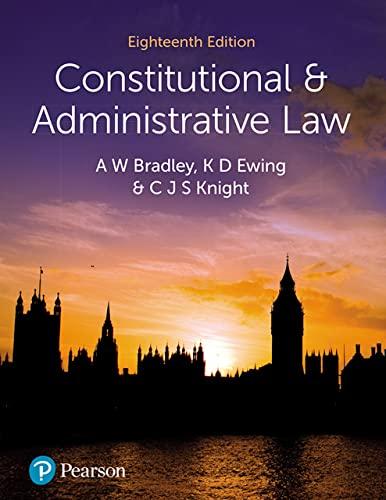Question
Respond to the following: Following the 9/11 terror attacks the U.S government pushed to rectify lapses that combined to allow for the success of the
Respond to the following: Following the 9/11 terror attacks the U.S government pushed to rectify lapses that combined to allow for the success of the attack. Almost immediately the Provide Appropriate Tools Required to Intercept and Obstruct Terrorism Act (PATRIOT Act) was passed with extraordinarily little external review or questioning from decision makers regarding what was included and whether everything was constitutional or not (Taylor & Swanson, 2018). The original PATRIOT Act included provisions to allow law enforcement the ability to conduct records searches of anyone's personal activities being held by a third party like a doctor, library or internet service provider; roving wiretaps were authorized with warrants being obtainable through the FISA court; no-knock warrants were authorized; sneak and peek searches of homes or businesses were allowed by federal law enforcement and finally, trap and trace orders could be done to determine any numbers dialed by a suspect phone (Taylor & Swanson, 2018). Many of these actions also included reduced checks and balances than law enforcement had to deal with prior to this and records checks did not even require a warrant but were obligatory for providers to comply with requests from law enforcement.
In 2006, 2011 and again in 2015, the PATRIOT Act was revised and continued. In 2006, due process protections were put back into place as roving wiretaps now had mandatory oversight to protect against law enforcement abuse of the tactic and records searches now required warrants for law enforcement to gather personal information (Taylor & Swanson, 2018). The 2011 revisions of the PATRIOT Act remained the same but included a new allowance for the federal government to surveil a suspect short-term if they switched phones or showed they were trying to evade surveillance. Finally, in 2015 the Freedom Act was signed into law to allow for the continued use of roving wiretaps, surveillance if someone shows evasive patterns of behavior and renewed the allowance for the NSA to gather bulk metadata on all American internet and telephone records (Taylor & Swanson, 2018).
While these provisions have allowed law enforcement to collect a literal mountain of information, there are many questions regarding the constitutionality of many of the provisions found in the PATRIOT Act and its subsequent revisions. For example, Pitt (2011) points out that the 4thAmendment to the constitution protects against unlawful searches and seizures and yet the original PATRIOT Act required third parties like doctors, libraries and internet providers to disclose personal information on a suspect whenever it was requested by law enforcement. This is a blatant 4thAmendment violation, where the government is arguing they did nothing wrong because the information was given 'voluntarily'. Pitt (2011) also explained that ". While all Americans are subjected to these laws, most often Muslims and Arabs experience more extreme versions due to the stereotypes associated with Islam and terrorism" (p. 56). The allowance for, or encouragement of discriminatory policing or law enforcement actions is also unlawful and flies in the face of equal protections statutes and other legal precedent. The unlawful detention issue also is found when the PATRIOT Act has been used to justify the indefinite detention of purported 9/11 suspects, or when justifying the denial of due process protections of individuals detained while travelling around the U.S. while Muslim. This latter example could represent a violation of the 1stAmendment of the constitution if a person's religion expression or use of free speech is the sole reason for detainment. In an unfortunately not too uncommon example, an IT director from London on a business trip to Los Angeles was detained in the airport on suspicion that he was a terrorist based solely on his ethnicity and manner of dress. He was held for almost a full day, refused access to a phone for the first 12 hours and when he requested food was given only ham sandwiches which as a devout Muslim he could not eat, finally he was returned to the airport and immediately deported (Wong, 2006). There are many examples of this type of behavior from law enforcement towards members of the Muslim community following the enactment of the PATRIOT Act.
While some may feel justified in behaving towards Muslims in this manner, Christ taught us "Judge not, that ye be not judged. For with what judgment ye judge, ye shall be judged: and with what measure ye mete, it shall be measured to you again" (KJV, Matt. 7:1-2). The teaching of Christ to not judge does not mean that we can't protect our communities, or that we cannot investigate and apprehend possible suspects; but it does mean that investigations, apprehension and detention need to be done correctly, and in a manner where prejudice or discrimination is not the driving factor. Finally, the words of Christ later in Matthew offer the standard of "whatsoever ye would that men should do to you, do ye even so to them" (KJV, Matt. 7:12). While it is necessary to prevent motivated offenders and terror groups from victimizing the innocent, morality and integrity should not be sacrificed in the effort of doing so.
References
King James Bible. (2023).KJV Online. https://www.churchofjesuschrist.org/study/scriptures/nt/matt/7?lang=eng
Pitt, C. (2011). U.S. patriot act and racial profiling: Are there consequences of discrimination?Michigan Sociological Review, 25, 53-69. Retrieved on February 13, 2024, from http://www.jstor.org/stable/41289191
Taylor, R.W., & Swanson, C.R. (2018).Terrorism, Intelligence and Homeland Security(2nd ed.). Pearson Education (US). https://bookshelf.vitalsource.com/books/9780134818245
Step by Step Solution
There are 3 Steps involved in it
Step: 1

Get Instant Access to Expert-Tailored Solutions
See step-by-step solutions with expert insights and AI powered tools for academic success
Step: 2

Step: 3

Ace Your Homework with AI
Get the answers you need in no time with our AI-driven, step-by-step assistance
Get Started


